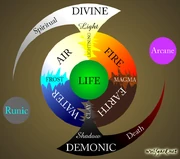I about died laughing when in act 4.1, line 15 on, Prospero basically warns Ferdinand in typical, protective, fatherly fashion to WAIT TIL MARRIAGE OR ELSE, in his own magical, somewhat threatening, words.
I found the appearance of the spirits, Iris, Ceres, Juno, etc. lovely, especially as a person with an affinity for the myths, gods, and goddesses of the classical era. Classical references like this were common in the Renaissance, and in this case was used by Shakespeare to reinforce the beauty of the marriage-celebration scene. It was nice and sparkly, and the inclusion of those classical references only heightened the loveliness it evoked.
 |
| Juno and Iris appear in the above picture. ~fancy~ |
You do look, my son, in a moved sort,As if you were dismayed. Be cheerful, sir.Our revels now are ended. These our actors,As I foretold you, were all spirits andAre melted into air, into thin air.And like the baseless fabric of this vision,The cloud-capped towers, the gorgeous palaces,The solemn temples, the great globe itself—Yea, all which it inherit—shall dissolve,And like this insubstantial pageant faded,Leave not a rack behind. We are such stuffAs dreams are made on, and our little lifeIs rounded with a sleep.
As I read this passage, I am overcome with thoughts of actors and the world of theater. Since this play was apparently Shakespeare's last, I wonder if this speech is not just Prospero's voice, but Will's too, acknowledging the conclusion of a play as Prospero acknowledges the end of his magical charms. At the beginning of the speech, when Prospero speaks to Ferdinand, telling him to cheer up after the abrupt end to the masque, I felt that I could resonate with Ferdinand's feelings; for instance, sometimes when I am deep in thought, perhaps listening to music, playing a videogame, or deep in a book, and am suddenly yanked out of my glorious fantasy world, I feel some disillusionment and dismay. I feel similarly when I see a play or movie, and walk back out into the harsh glare of the real world. The fantasies that are evoked within that experience are then "melted into thin air... and like this insubstantial pageant faded, leave not a rack behind." When the play ends, the actors pack up their props and go home. The sets are deconstructed and put away. The audience returns to the tedium of daily life. Prospero's spirits "dissolved" just as every experience in visual/sensory media does after we SAVE and QUIT, or turn OFF. This speech, as I read it, also caused me to have an existential crisis - I sat in front of my book wide-eyed, frozen at the thought that we all eventually "melt into thin air," "dissolve," and leave nothing behind.
 |
| Same. |
Crises aside, I thoroughly enjoyed the play. I really appreciate how much I was actually able to understand it, allowing it to make me laugh, or cower in fear as I contemplated my eventual "dissolving."
 |
| How cool is this though? |






